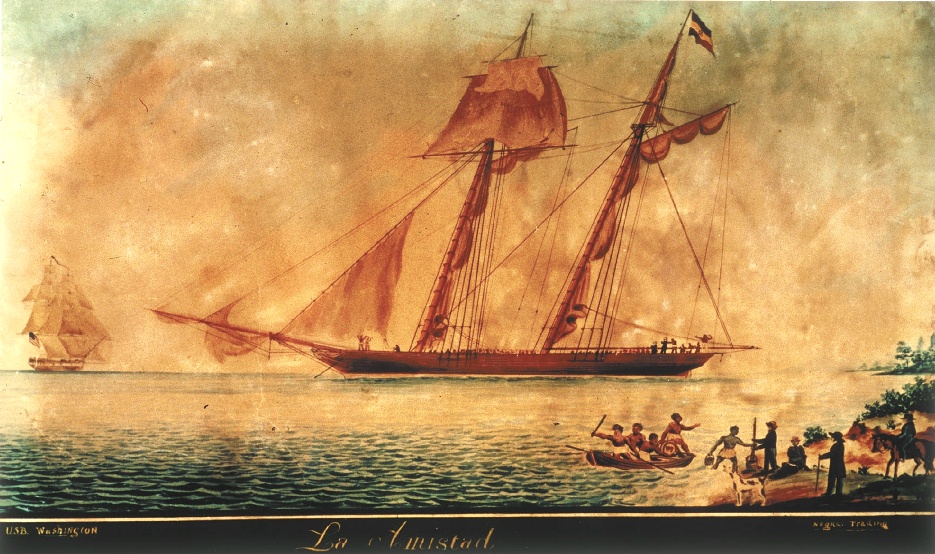“We are not makers of history. We are made by history.” – Martin Luther King, Jr.

Twenty-five years before the Thirteenth Amendment to the US Constitution, an incident took place that squarely placed the issue of slavery before the public and the courts.
In 1839, fifty-three Africans were kidnapped from Sierra Leone and sold into slavery. While being transferred by ship from one side of Cuba to another, one of the slaves, Joseph Cinque, led a revolt killing all but two of the crew aboard the Spanish ship, La Amistad. The two remaining crew members tricked the slaves into believing they were sailing back to Sierra Leone when, in fact, they had sailed northward, eventually reaching New York where the fifty-three were taken into custody by US officials.
While the Africans were imprisoned in Connecticut, the Spanish government, which still controlled Cuba, demanded the return of both the ship and its cargo.
In the North, however, public opinion was turning against slavery, and several ministers and businessmen rallied a defense of the Amistad Africans. After hearing testimony for and against the return of the Africans to their native land, the federal judge in the case ruled in favor of the fifty-three.
However, displeased with the decision and not wanting a confrontation with either Southerners or the Spanish, President Martin Van Buren appealed the decision to the US Supreme Court, on which seven of the nine justices were slave owners from the south.
In a compelling opening argument, former President John Quincy Adams criticized Van Buren and argued that the Africans were persons not cargo.
“Why are we here? How is it that a simple, plain property issue should now find itself so ennobled as to be argued before the Supreme Court of the United States of America? Do we fear the lower courts, which found for us, missed the truth? Or is it, rather, our great and consuming fear of civil war that has allowed us to heap symbolism upon a simple case that never asked for it? …
“This is no mere property case, gentlemen. This is the most important case ever to come before this court. Because what it in fact concerns is the very nature of man. …
“Cinque, would you stand up, if you would, so everyone can see you. This man is black. We can all see that. But can we also see as easily that which is equally true? That he is the only true hero in this room. If he were white, he wouldn’t be in this court, fighting for his life. If he were white and his enslavers British, he’d be weighed down by the medals and honors we would bestow upon him. …
“Yet, if the South is right, what are we to do with that embarrassing, annoying document, ‘The Declaration of Independence’? What of its conceits? ‘All men created equal,’ ‘inalienable rights,’ ‘life, liberty,’ and so on. What on Earth are we to do with this? I have a modest suggestion.
“The other night I was talking with my friend Cinque. …He explained to me how when a member of the Mende – that’s his people… How when a member of the Mende encounters a situation where there appears no hope at all, he invokes his ancestors; tradition. The Mende believe that if one can summon the spirit of one’s ancestors, then they have never left. And the wisdom and strength they fathered and inspired will come to his aid.
“James Madison, Alexander Hamilton, Benjamin Franklin, Thomas Jefferson, George Washington, John Adams. We have long resisted asking you for guidance. Perhaps we have feared in doing so, we might acknowledge that our individuality, which we so, so revere, is not entirely our own. Perhaps we feared an appeal to you might be taken for weakness. But we have come to understand, finally, that this is not so. We understand now… We’ve been made to understand, and to embrace the understanding that who we are is who we were.
“We desperately need your strength and wisdom to triumph over our fears, our prejudices, ourselves. Give us the courage to do what is right. And if it means civil war, then let it come. And when it does, may it be, finally, the last battle of the American Revolution. That’s all I have to say in the case of the United States of America versus the Amistad Africans.”
The Supreme Court held for the Amistad Africans, and… the great Civil War was yet to come.
Comments










